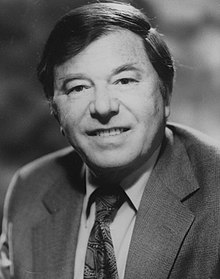Professor James Durbin | |
|---|---|
 | |
| Born | 30 June 1923[1] Widnes, England |
| Died | 23 June 2012 (aged 88) |
| Citizenship | United Kingdom |
| Alma mater | St John's College, Cambridge |
| Known for | Time series analysis Serial correlation Durbin–Watson statistic Durbin test Levinson–Durbin algorithm |
| Children | Richard Durbin |
| Awards | Guy Medal (Bronze, 1966) (Silver, 1976) (Gold, 2008) Fellow of the British Academy |
| Scientific career | |
| Fields | Statistics Econometrics |
| Institutions | London School of Economics University of Cambridge |
| Academic advisors | Henry Daniels |
James Durbin FBA (30 June 1923 – 23 June 2012) was a British statistician and econometrician, known particularly for his work on time series analysis and serial correlation.[2][3][4][5][6]
Education
[edit]The son of a greengrocer, Durbin was born in Widnes, where he attended the Wade Deacon Grammar School.[7] He studied mathematics at St John's College, Cambridge, where his contemporaries included David Cox and Denis Sargan. After wartime service in the Army Operational Research Group, he worked as a statistician for two years with the British Boot, Shoe and Allied Trades Research Association and took a postgraduate diploma in mathematical statistics at Cambridge, supervised by Henry Daniels.[7]
Career
[edit]After two years at the department of applied economics in Cambridge, Durbin joined the London School of Economics in 1950 and was appointed professor of statistics in 1961,[7] a post he held until his retirement in 1988.
Awards and honours
[edit]He served as president of the International Statistical Institute from 1983 to 1985, and as president of the Royal Statistical Society (RSS) from 1986 to 1987.[8] In 2008 he was awarded the highest distinction of the RSS, the Guy Medal in Gold (having previously been awarded both the Silver and Bronze medals). The citation read:
The Guy Medal in Gold is awarded to Professor James Durbin FBA for a life-time of highly influential contributions which have given him outstanding international recognition as a leader in our field, taking particular account of his pioneering work on testing for serial correlation in regression, on estimating equations, on Brownian motion and other processes crossing curved boundaries, on goodness of fit tests with estimated parameters, and on many aspects of time series analysis especially in areas relevant to econometrics, and also his remarkable service to the wider statistical profession on the international stage.[9]
His last book, Time Series Analysis by State Space Methods,[10] was published by Oxford University Press in May 2012. His last books were co-authored by Siem Jan Koopman of VU University Amsterdam. He died on 23 June 2012.[11][12]
References
[edit]- ^ John Grant (1970). Who's who of British scientists. Longman. ISBN 978-0-582-11464-7. Retrieved 27 June 2012.
- ^ Durbin, J.; Watson, G. S. (1950). "Testing for Serial Correlation in Least Squares Regression: I". Biometrika. 37 (3–4). Biometrika Trust: 409–428. doi:10.2307/2332391. JSTOR 2332391. PMID 14801065.
- ^ "Statistics in the University of London : Prof. James Durbin". Nature. 191 (4795): 1247. 1961. Bibcode:1961Natur.191Q1247.. doi:10.1038/1911247b0. S2CID 9887346.
- ^ Phillips, P. C. B. (2010). "The ET Interview: Professor James Durbin". Econometric Theory. 4: 125–157. doi:10.1017/S0266466600011907. S2CID 121788280.
- ^ Harvey, A.C.; Koopman, S.J.; Shephard, N., eds. (2004). "Preface: About Professor James Durbin". State Space and Unobserved Component Models: Theory and Applications (Proceedings of a conference in honour of James Durbin). Cambridge University Press. p. xii. ISBN 978-0-521-83595-4.
- ^ "ISI Honorary Member Interviews: Professor James Durbin". Archived from the original on 9 March 2021. Retrieved 31 August 2008.
- ^ a b c "Durbin, James". Oxford Dictionary of National Biography (online ed.). Oxford University Press. doi:10.1093/ref:odnb/106536. (Subscription or UK public library membership required.)
- ^ "Royal Statistical Society Presidents". Royal Statistical Society. Archived from the original on 17 March 2012. Retrieved 6 August 2010.
- ^ "LSE — Statistics — News". Retrieved 28 February 2008.
- ^ Durbin, J. (2012). Time Series Analysis by State Space Methods. Oxford Statistical Science Series. Oxford University Press. ISBN 978-0-19-964117-8.
- ^ "Jim Durbin". University College London. 26 June 2012.
- ^ "Renowned statistician and former RSS President, Professor James Durbin, dies". RSSeNews. Royal Statistical Society. 26 June 2012. Archived from the original on 30 June 2012. Retrieved 2 July 2012.